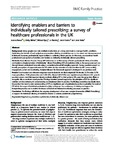Identifying enablers and barriers to individually tailored prescribing: a survey of healthcare professionals in the UK
| dc.contributor.author | Reeve, J | |
| dc.contributor.author | Britten, N | |
| dc.contributor.author | Byng, R | |
| dc.contributor.author | Fleming, J | |
| dc.contributor.author | Heaton, J | |
| dc.contributor.author | Krska, J | |
| dc.date.accessioned | 2018-03-06T13:58:53Z | |
| dc.date.available | 2018-03-06T13:58:53Z | |
| dc.date.issued | 2018-12 | |
| dc.identifier.issn | 1471-2296 | |
| dc.identifier.issn | 1471-2296 | |
| dc.identifier.other | 17 | |
| dc.identifier.uri | http://hdl.handle.net/10026.1/10986 | |
| dc.description.abstract |
BACKGROUND: Many people now take multiple medications on a long-term basis to manage health conditions. Optimising the benefit of such polypharmacy requires tailoring of medicines use to the needs and circumstances of individuals. However, professionals report barriers to achieving this in practice. In this study, we examined health professionals' perceptions of enablers and barriers to delivering individually tailored prescribing. METHODS: Normalisation Process Theory (NPT) informed an on-line survey of health professionals' views of enablers and barriers to implementation of Individually Tailored Prescribing (ITP) of medicines. Links to the survey were sent out through known professional networks using a convenience/snowball sampling approach. Survey questions sought to identify perceptions of supports/barriers for ITP within the four domains of work described by NPT: sense making, engagement, action and monitoring. Analysis followed the framework approach developed in our previous work. RESULTS: Four hundred and nineteen responses were included in the final analysis (67.3% female, 32.7% male; 52.7% nurse prescribers, 19.8% pharmacists and 21.8% GPs). Almost half (44.9%) were experienced practitioners (16+ years in practice); around one third reported already routinely offering ITP to their patients. GPs were the group least likely to recognise this as consistent usual practice. Findings revealed general support for the principles of ITP but significant variation and inconsistency in understanding and implementation in practice. Our findings reveal four key implications for practice: the need to raise understanding of ITP as a legitimate part of professional practice; to prioritise the work of ITP within the range of individual professional activity; to improve the consistency of training and support for interpretive practice; and to review the impact of formal and informal monitoring processes on practice. CONCLUSION: The findings will inform the ongoing development of our new complex intervention (PRIME Prescribing) to support the individual tailoring of medicines needed to address problematic polypharmacy. | |
| dc.format.extent | 17- | |
| dc.format.medium | Electronic | |
| dc.language | en | |
| dc.language.iso | eng | |
| dc.publisher | Springer Science and Business Media LLC | |
| dc.subject | Polypharmacy | |
| dc.subject | Medicines optimisation | |
| dc.subject | Individually tailored care | |
| dc.title | Identifying enablers and barriers to individually tailored prescribing: a survey of healthcare professionals in the UK | |
| dc.type | journal-article | |
| dc.type | Article | |
| plymouth.author-url | https://www.ncbi.nlm.nih.gov/pubmed/29334913 | |
| plymouth.issue | 1 | |
| plymouth.volume | 19 | |
| plymouth.publication-status | Published | |
| plymouth.journal | BMC Family Practice | |
| dc.identifier.doi | 10.1186/s12875-017-0705-2 | |
| plymouth.organisational-group | /Plymouth | |
| plymouth.organisational-group | /Plymouth/Faculty of Health | |
| plymouth.organisational-group | /Plymouth/Faculty of Health/Peninsula Medical School | |
| plymouth.organisational-group | /Plymouth/REF 2021 Researchers by UoA | |
| plymouth.organisational-group | /Plymouth/REF 2021 Researchers by UoA/UoA03 Allied Health Professions, Dentistry, Nursing and Pharmacy | |
| plymouth.organisational-group | /Plymouth/Research Groups | |
| plymouth.organisational-group | /Plymouth/Research Groups/FoH - Community and Primary Care | |
| plymouth.organisational-group | /Plymouth/Research Groups/Institute of Health and Community | |
| plymouth.organisational-group | /Plymouth/Research Groups/Institute of Translational and Stratified Medicine (ITSMED) | |
| plymouth.organisational-group | /Plymouth/Research Groups/Institute of Translational and Stratified Medicine (ITSMED)/CCT&PS | |
| plymouth.organisational-group | /Plymouth/Research Groups/Plymouth Institute of Health and Care Research (PIHR) | |
| plymouth.organisational-group | /Plymouth/Users by role | |
| plymouth.organisational-group | /Plymouth/Users by role/Academics | |
| dc.publisher.place | England | |
| dcterms.dateAccepted | 2017-12-26 | |
| dc.identifier.eissn | 1471-2296 | |
| dc.rights.embargoperiod | Not known | |
| rioxxterms.versionofrecord | 10.1186/s12875-017-0705-2 | |
| rioxxterms.licenseref.uri | http://www.rioxx.net/licenses/all-rights-reserved | |
| rioxxterms.licenseref.startdate | 2018-01-15 | |
| rioxxterms.type | Journal Article/Review |


